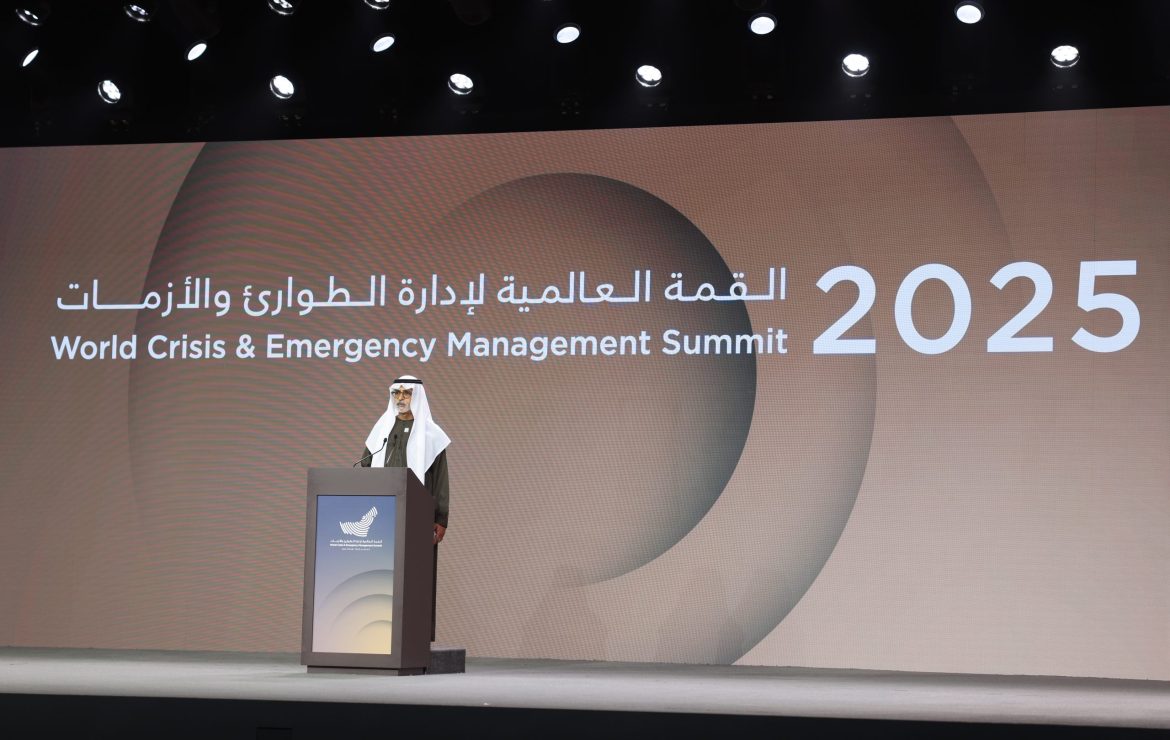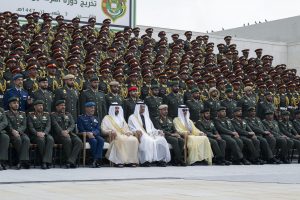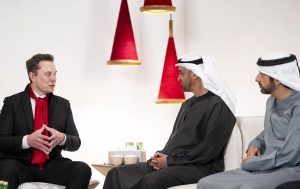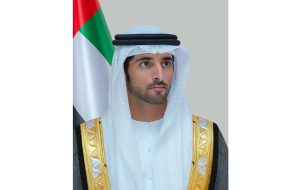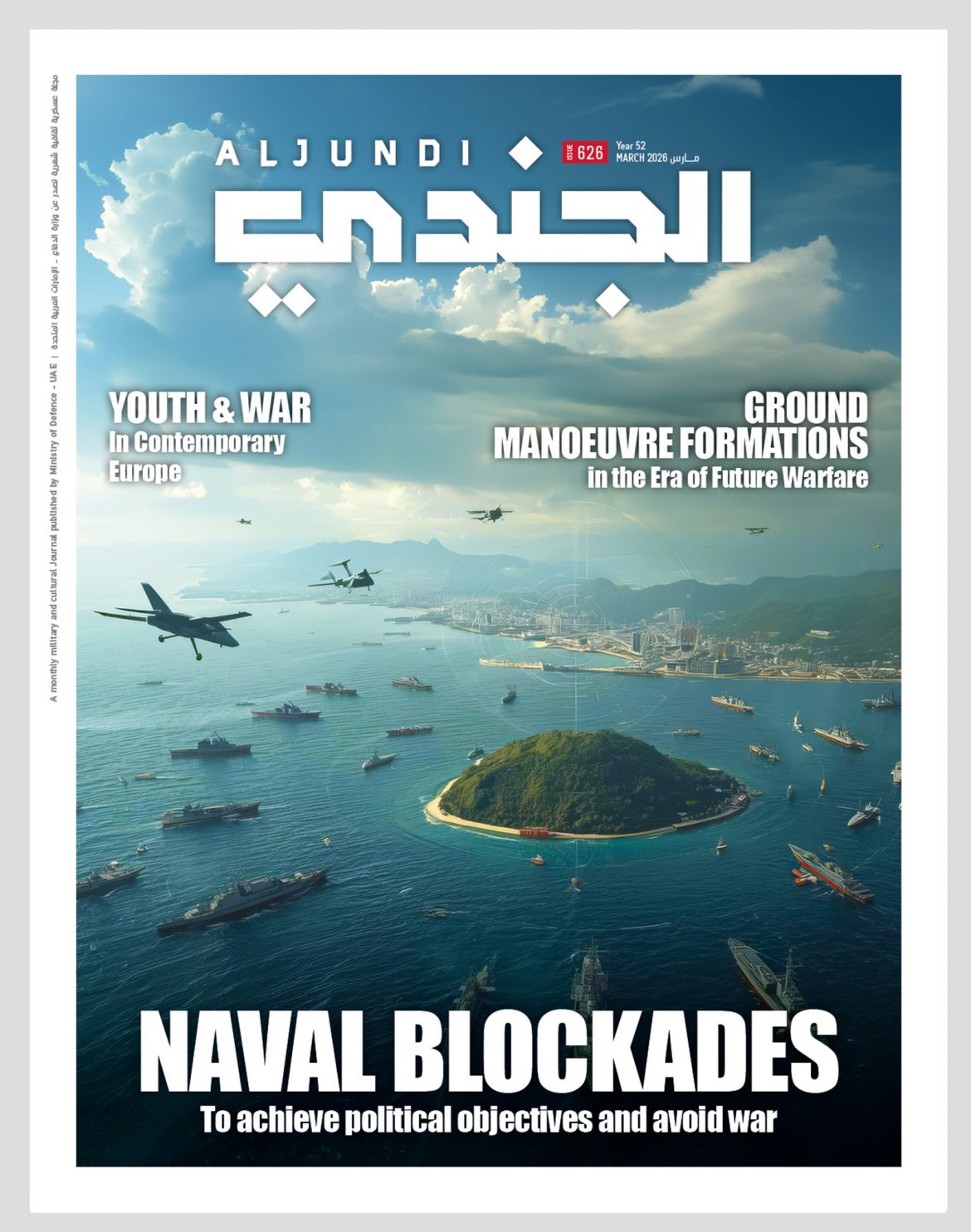Under the patronage of His Highness Sheikh Tahnoon bin Zayed Al Nahyan, Deputy Ruler of Abu Dhabi and National Security Advisor, the World Crisis and Emergency Management Summit 2025 concluded on April 9, following two days of high-level discussions and exhibitions held at the Abu Dhabi National Exhibition Centre (ADNEC). Organised by the National Emergency Crisis and Disaster Management Authority (NCEMA), this year’s summit marked its most internationally attended edition to date, held under the theme “Together Towards Building Global Resilience.”
His Excellency Sheikh Nahyan bin Mubarak Al Nahyan, UAE Minister of Tolerance and Coexistence, inaugurated the summit on April 8, alongside the Crisis Management Technologies Exhibition and the Generation Readiness Exhibition, both running in parallel with the summit’s proceedings.
The opening ceremony drew a distinguished audience of local and international government officials, decision-makers, scholars, and representatives from global organisations and leading technology companies, as well as humanitarian aid leaders and crisis response professionals.
Delivering the keynote address titled “Global Resilience: Safeguarding Future Generations”, H.E. Sheikh Nahyan bin Mubarak welcomed participants, stating, “This summit is driven by a noble purpose – to save lives and protect the safety of individuals and communities around the world.”
He expressed his gratitude to H.H. Sheikh Tahnoon bin Zayed for his generous patronage and to NCEMA for organising what he called a “vital platform for the exchange of insights, knowledge, and best practices in a field of critical global importance.”
His Excellency underscored the UAE’s pride in the strength and efficiency of its national strategies for managing both natural and man-made disasters, praising the collaborative efforts of NCEMA and its national partners in implementing world-class emergency policies.
He also highlighted Abu Dhabi’s significant role as host city:
“This summit is a reflection of the vision of His Highness Sheikh Mohammed bin Zayed Al Nahyan, President of the UAE, who remains committed to empowering individuals and institutions, advancing knowledge, and strengthening international and regional cooperation.”
Moreover, His Excellency explained that the foundations of a prosperous society are security and safety and that strong community support is essential during times of need.
“We take great pride in the UAE’s remarkable capacity to respond to the needs of its people,” he said. “This summit is a true reflection of His Highness’s vision—one that reinforces the nation’s unwavering commitment to protecting lives and promoting community safety locally and globally.”
Sheikh Nahyan emphasised the importance of societal resilience, saying: “A thriving society prepares effectively for challenges—be they climate change, pandemics, wars, cyber threats, or terrorism. This summit helps us better understand these risks and equips us with the tools and technologies to confront them collaboratively on a global scale.”
He further stressed the need for unity, human values, and solidarity in facing global emergencies, calling for mutual support among nations, institutions, and individuals alike.
“I am confident in our collective ability to overcome adversity—not as a matter of blind optimism, but as a firm belief that our success hinges on responses grounded in shared human values.”
Calling for the adoption of successful global experiences, he highlighted the need to foster decision-making capacities that are swift, informed, and community-oriented, particularly in times of crisis.
He concluded by reaffirming the value of personal and social resilience:
“Resilience empowers us to adapt to a rapidly changing world. It reflects the positive potential within each person to make a meaningful impact on others’ lives.”
“Key skills such as communication, organisation, dialogue, conflict resolution, negotiation, empathy, and teamwork are vital to enhancing resilience and building more adaptive communities,” he added.
In his closing remarks, Sheikh Nahyan extended his appreciation once more to H.H. Sheikh Tahnoon bin Zayed for his unwavering support of the summit and thanked all participants for their dedication to advancing community safety and global crisis response.
For his part, H.E. Ali Saeed Al Neyadi, Chairman of NCEMA stated: “This summit underscores the global stature the UAE has attained in emergency response, thanks to the visionary leadership of His Highness Sheikh Mohammed bin Zayed Al Nahyan. The UAE has emerged as a unique model in future foresight, strategic planning, and international partnership building.”
He stressed that cross-border challenges require cross-border solutions, saying:
“Our proactive, future-oriented approach drives the purpose of this summit—to serve as a global platform for unifying efforts, sharing expertise, and integrating crisis management systems worldwide.”
Strategic Themes Featured on Day One of the Summit:
Global Capabilities
The summit opened with a focus on “Global Capabilities,” featuring a keynote address by H.E. Dr. Saif Al Dhaheri, Director of the National Operations Centre, titled “Unlocking Future Horizons.” Dr Al Dhaheri stressed the importance of developing adaptable systems that embrace innovation and safeguard vital services during crises. He projected a twentyfold increase in the use of unmanned and autonomous aerial systems in disaster response by 2028 and predicted that AI would support 70% of crisis-related decisions by 2030.
Further strengthening the theme of international cooperation, H.E. Kamaladdin Heydarov, Azerbaijan’s Minister of Emergency Situations, spoke on “Building Resilient Systems: Enhancing International Collaboration for Crisis Preparedness.” He highlighted the urgency of developing integrated frameworks to navigate unpredictable global threats.
A community-centric approach to resilience was championed by Dr Fabio Ciilino, Head of Italy’s Civil Protection Department, in his address “Risks in Harmony: A Community-Based Approach.” He underlined the value of engaging local communities in every phase of planning and response.
Carlos Torres Vidal, Director of the Incident and Emergency Centre at the International Atomic Energy Agency (IAEA) presented a lecture titled, “Connecting Global Capabilities: A United Front,” calling for robust coordination among international institutions to ensure a streamlined and effective emergency response.
The session concluded with a dynamic panel discussion that gathered all speakers to explore mechanisms for effective global integration in emergency and crisis management.
Bridging Capabilities
The summit’s second theme, “Bridging Capabilities,” kicked off with a speech from Fahad Butti Al Muhairi, Director of Safety and Prevention at NCEMA, titled “Pursuing Common Principles.” Al Muhairi underscored the need for a proactive, unified global vision for crisis management—one that goes beyond mere response and focuses on shared responsibilities and preventive strategies.
He noted that global cooperation is essential for limiting risk, and true security depends not only on resources but also on cooperation and knowledge-sharing.
In a session on leadership during emergencies, Pete Gaynor, former Administrator of the U.S. Federal Emergency Management Agency (FEMA), delivered a keynote titled “Enhancing Resilience Through Innovation and Cooperation,” where he stressed the importance of exceptional leadership and coordinated strategies in times of crisis.
Adding a transformative perspective, humanitarian and development expert Kilian Kleinschmidt delivered an inspiring lecture titled, “From Crisis to Opportunity,” demonstrating how adversity can be converted into pathways for sustainable change.
The summit concluded its first day with an energising session by Lars Sudmann, global leadership and change expert, titled “Breaking Barriers for a Better Tomorrow.” His presentation explored the principles of strategic leadership during emergencies, encouraging adaptability, vision, and decisive action.
Major Exhibitions Elevate the Summit Experience
Crisis Management Technologies Exhibition
The Crisis Management Technology Exhibition returns this year at a pivotal moment marked by unprecedented shifts in the tech landscape and a rapid acceleration in the development and adoption of artificial intelligence across key sectors. These transformations amplify the exhibition’s relevance and reinforce its role as a premier platform for showcasing breakthrough technologies in emergency response and disaster preparedness.
Positioned as an international hub for innovation and knowledge-sharing, the exhibition highlights a wide array of smart command and control systems, AI-powered big data analytics tools, and early warning technologies designed to detect natural, environmental, and public health threats before they escalate.
Among the standout features are live field simulation models, advanced robotics, unmanned aerial systems (drones), and immersive training tools that utilise virtual and augmented reality to enhance emergency preparedness for frontline personnel.
The showcased technologies represent a new generation of crisis management solutions and underscore the UAE’s commitment to digital transformation in this critical sector.
Generation Readiness Exhibition
In alignment with the UAE’s declaration of 2025 as the “Year of the Community,” the Generation Readiness Exhibition was designed to foster a culture of preparedness among youth. With hands-on activities, emergency scenario simulations, and interactive learning zones, the exhibition targeted children and young people, equipping them with essential knowledge and tools for effective crisis response.
The exhibition featured educational workshops on natural disaster awareness, basic emergency procedures, and family response planning. Young visitors were introduced to smart emergency apps and tools, and engaged in discussions that nurtured values of discipline, readiness, and community cohesion in times of crisis.
Distinguished Participation
The summit witnessed significant contributions from national and international institutions. The UAE Ministry of Defence participated as a strategic partner, showcasing advanced AI-powered surveillance drones, hazardous materials detection systems, and modern land, air, and sea rescue equipment.
Strengthening National Readiness
A delegation from the Office of H.H. the Minister of Defence participated in the summit, reaffirming the UAE’s steadfast commitment to national readiness and knowledge exchange in emergency response. The delegation toured the accompanying exhibition, which featured cutting-edge technologies and best practices from regional and international institutions. They also engaged in discussions aimed at deepening cooperation and fostering innovation in this critical sector.
Spotlight on Civil Defence Innovations
The General Directorate of Civil Defence showcased its advanced emergency response capabilities, particularly in early warning systems and self-sensing technologies in vital infrastructure. Notably, the event featured the Thermite RS3 firefighting robot, engineered to operate in high-risk environments, and a rapid-response urban search and rescue vehicle equipped with life-saving tools.
Dubai Civil Defence introduced several pioneering solutions, including the Shaheen drone for high-rise firefighting, an electric Hummer H2 emergency vehicle designed for rugged terrains, and the AI-powered DCD Readiness programme for predictive incident analysis and resource allocation. The organisation also highlighted its ‘1 Billion Readiness’ initiative, which aims to train one billion people worldwide in fire safety.
Moreover, the Advanced Technology Research Council (ATRC) of Abu Dhabi presented an impressive portfolio of crisis response innovations, including:
Falcon, a generative AI platform offering rapid, data-driven decision-making insights.
A GNSS-Free Navigation System for precise mobility in GPS-deprived environments.
Centurion, an AI-powered security system for real-time threat detection and facility protection.
The Synthetic Aperture Radar (SAR) mapping and rescue system, leverages advanced sensing to accelerate disaster response.
Additionally, NAFFCO showcased a wide range of safety and firefighting solutions used in over 100 countries, including airport emergency response vehicles and water drainage systems for urban settings.
Noggin revealed the UAE launch of Noggin 2.0, its integrated crisis management platform offering cloud-based solutions that support the full emergency lifecycle—from preparedness through recovery.
Dubai Police underlined its use of AI and cutting-edge technologies in emergency response, including its command and control centre and early warning systems. The force also displayed a Tesla Cybertruck and a state-of-the-art off-road rescue vehicle, demonstrating its strategy to build a safer and more resilient society.
Cybersecurity leader ENKI exhibited smart risk management tools powered by AI and satellite data, designed to help organisations make proactive decisions and safeguard digital infrastructure.
Khalifa University presented research projects led by its Institute for International and Civil Security, with a focus on data-driven risk prediction and emergency response. The university also showcased student-led studies reinforcing the role of academia in preparing future-ready national talents.
Expert-led Workshops and Thought Leadership
The summit’s first day featured four core workshops, offering participants in-depth training on crisis management and leadership development:
Mental Models of Leaders for Anticipatory Thinking in Crises by Lars Sudmann
Leadership Development in Emergency and Crisis Management by Pete Gaynor
Strategic Development for Effective Crisis Management by Maha Al Maisari (Khalifa University)
AI Innovation and Decision-Making During Crises by Dr Velibor Bojkovic and Dr Hilal Al Qouba’a (Mohamed bin Zayed University of AI)
High-Level Dialogues on Day Two
Day two centred around the third summit theme, “Navigating Uncertainty”, highlighting the importance of agile strategies to manage unforeseen crises and emerging global threats. Discussions focused on data-driven decision-making, predictive analytics, and building adaptable systems capable of rapid response.
The fourth theme, “Adaptive Economies”, explored innovative approaches for building economic resilience and advancing international cooperation in times of crisis. Additional workshops addressed the role of AI and emerging technologies in disaster and emergency response.
Zayed Galaxy: The Future of Risk Awareness
As part of its participation in the Global Emergency and Crisis Management Summit 2025, NCEMA unveiled the “Zayed Galaxy” interactive platform—an advanced smart solution designed to anticipate risks and strengthen national preparedness using artificial intelligence and cutting-edge interactive technologies.
The Zayed Galaxy serves as a forward-looking showcase, enabling individuals and organisations to better understand and engage with potential future risks through an immersive digital environment powered by AI and sensory-visual interaction. The platform aims to support strategic, data-driven decision-making, helping entities respond swiftly and accurately to emerging threats by offering predictive insights and advanced risk analysis tools.
Visitors interacted with an intelligent robot capable of explaining risk types, providing guidance, and demonstrating response strategies on the individual, institutional and governmental levels.
Moreover, NCEMA confirmed that the Zayed Galaxy platform is currently in its initial phase, with future plans to expand its risk database and enhance interactive capabilities. The ultimate goal is to develop the platform into a comprehensive national tool that supports decision-making across all stages of emergency and crisis response.
The platform features a state-of-the-art holographic display equipped with sound and motion sensors. At this stage, it showcases four primary categories of risk: environmental, biological, space-related, and cyber threats—providing an immersive and intuitive interface for understanding complex challenges in real time.
Reported by: Razi Izzeddin Elhadmi
Photography by: Abdullah Al Suwaidi


